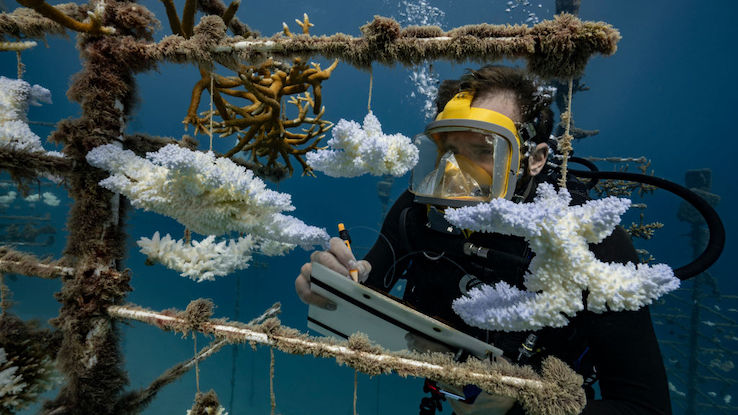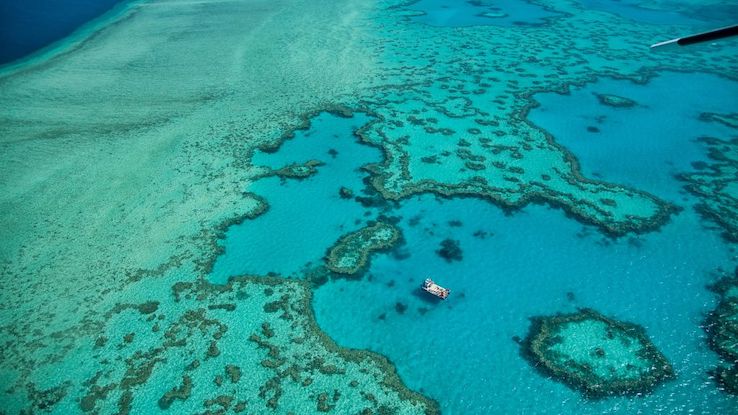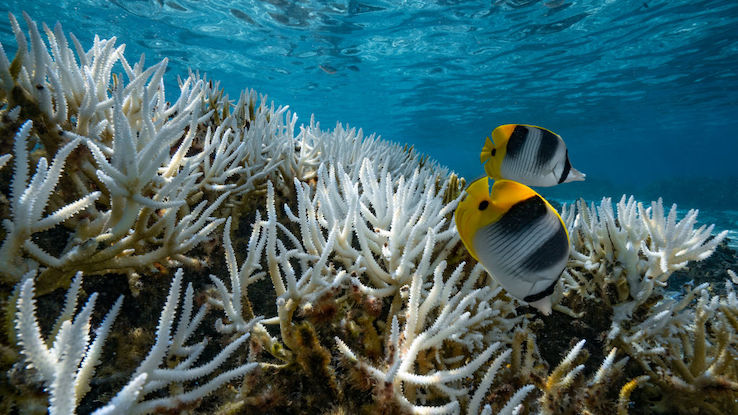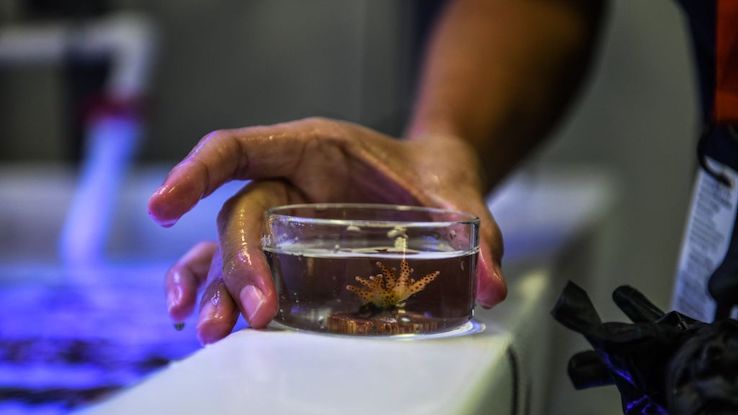This Research on Coral Reefs Is Leading to Climate Change Discoveries

Gone are the days when vibrant, colorful coral reefs spanned hundreds of miles across shallow sea waters. Due to rising global temperatures, some coral reefs are starting to bleach and starve, while others are turning brown and dying off. Although we can hope that coral reefs withstand stressors like overfishing and sea construction in time for us to turn their effects around, climate change has continuously imposed relentless pressure — more than many corals can handle. At this rate, coral reefs may become non-existent in less than a century and lead to loss of opportunities in tourism, fishing, and protection from storms and erosion.
Fortunately, research scientists are studying corals and discovering ways to combat the effects of climate change on coral reefs. Here, we’ll explore how climate change affects coral reefs, how scientists study coral reefs, and how their research findings protect coral reefs and predict trends in climate systems. Ready to dive in?
How Does Climate Change Affect Coral Reefs?
Corals are live animals that attach themselves to rocks on the seafloor. They survive on algae living within their own tissues. Many corals make up a coral reef and gain vibrant colors from the algae and beautiful fish that inhabit them.
However, corals are sensitive to changes in light and temperature — meaning climate change causes corals to bleach. During this process, corals let go of the algae living on and in their tissues, and they subsequently starve. Usually, corals change color to dark brown or white. Though corals remain alive during bleaching, the vulnerable creatures are at risk of dying if the harsh climate conditions persist.
What Is Coral Paleoclimatology?

Coral paleoclimatology is research that studies coral reefs to determine the evolution of climate change. Specifically, it’s the scientific study of historical climate data prior to existing records, using coral as its basis. Coral reefs serve as significant data points for reconstructing a timeline of the past effects of climate change. Since coral reefs have grown for millions of years, scientists compare modern corals to skeletons from centuries ago to discover the shifts climate change has caused on the growth of coral reefs.
These studies are essential in studying the history of climate change and its long-term impacts. Research findings inform scientists about the health of coral reefs. This research can also help them identify ways to ensure reefs remain unaffected by future climate change that would be harmful to their growth and development. Using these data, scientists can predict trends in climate change and use that information to help shape policies that support the development of coral reefs.
Often, scientists dive deep into the sea to extract corals. Then, they extract small samples for study, though sometimes they visually assess the corals while underwater. Using X-ray imaging, scientists find out patterns and trends in corals that have lived during periods.
By marking each coral with the place and season it was alive, researchers can study each sample for aspects like density, growth bands, oxygen composition and bleaching effects. These details help them determine sea temperatures and other conditions attributed to climate change. Over time, scientists can build a record of climate change and discover how it led to harmful changes to coral reefs.
What Do the Research Findings Reveal About Coral Reefs?

While research findings show that sea levels control the growth rate of coral reefs, they also show that climate change plays the most significant factor in coral reef development. Research has found that warmer, more stable climates contribute to vibrant reef growth. However, colder temperatures and increased winter fronts led to slower growth and eventual non-existent growth of coral reefs in South Florida.
On the other hand, modern climate trends are causing increased global temperatures and a rise in sea levels at an unexpected rate. These effects of climate change are shifting regular seasons to extremes. High temperatures also result from increased pollution and greenhouse gasses due to human activities. And when the oceans absorb this carbon monoxide, it causes decreased pH levels — a process called ocean acidification.
Consequently, coral reefs start to bleach, and new coral reefs can’t form due to reduced calcification. Aside from directly impacting reef development, climate change also causes intense storms, which dramatically affect coral reef ecosystems when coupled with human activities like overfishing.
How Are Scientists Using Coral Paleoclimatology?
Research findings from the study of coral reefs help predict trends in climate systems. For instance, coral reefs can help in the study of tropical ocean behaviors to predict El Nino patterns that can cause disease outbreaks and heat stress. With this information, residents can then prepare adequately to avoid putting pressure on available resources. That’s because they have a better idea of when weather disruptions will be likely.
Additionally, scientists can use coral reef studies to shape policy recommendations that combat the effects of climate change. Coral reefs provide income to marine fisheries and boost tourism within tropical countries. Using research data, scientists can recommend policies that help keep these industries running before it’s too late. They may do this, for instance, by engaging in reef-restoration programs to plant corals in the sea — enough for the corals to reproduce themselves before they’re extinct.

Alternatively, scientists harvest corals that are naturally resistant to stressors. They study these corals and investigate ways to reproduce the species genetically and reattach them to the reef. This helps regrow corals that are resistant to stressors so they can breed in reefs at extensive reach. One example involves Ross Cunning, a research biologist who hopes to reproduce corals with robust genes that can withstand heat waves.
Saving the Coral Reefs
Ultimately, the race to protect coral reefs against climate change has only begun. While the damage to historically vibrant corals is beyond reversal, it may be possible that recent climate change discoveries will pave the way back to ensuring the survival of coral reefs for centuries to come.
Currently, there are short-term methods of saving coral reefs through natural selection and reproducing corals with robust genes. However, combating climate change seems to be the key way to ensure the conservation and restoration of coral reefs worldwide. Hopefully, new policies will be enacted to bring these changes to light and help save coral reefs.





